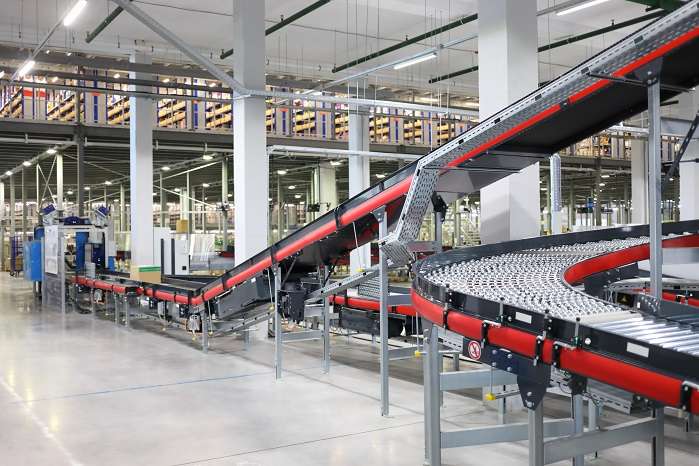Manufacturing operations are typically complex and resource-heavy. Often, the production process runs as a whole, and minor changes or disruptions to that process can cause time and resource losses.
But in a business world increasingly moving at light speed, manufacturers cannot afford lumbering operations that are slow to react to change. Maintaining a lean and dynamic operation can provide a significant business advantage, and flexible manufacturing systems are one-way companies address this need.
Studies show that flexible manufacturing systems promote operational agility and can boost productivity by 50% or more.1 Additionally, companies with a flexible production setup can become more competitive and potentially upgrade their market position.
If you’re wondering what a flexible manufacturing system is and how it can enhance your operations, we’re here to help. This article explains what flexible manufacturing systems entail, their key features, and the pros and cons to consider.
Table of Contents
A flexible manufacturing system (FMS) is a production method focused on adaptability. It stems from the recognition that no manufacturing operation is set in stone — changes are always bound to happen, both big and small.
Consequently, an FMS works to accommodate production changes without affecting quality, budget, or production deadlines. Flexible production offers a higher degree of agility, enabling faster response to changes in product specifications, features, or an entirely new production run.
Because it’s an entire system, every aspect of an FMS is automatically calibrated to accept and incorporate manufacturing changes without slowdowns or delays. As a result, FMS depends on technology to swiftly and accurately pivot production as requirements change.
FMS is often used to power “made-to-order” production processes where clients dictate product specs and other details.
As you’ve seen, the core feature of FMS is its flexibility. This flexible manufacturing process has two main aspects: machine flexibility and routing flexibility.
Machine flexibility refers to a machine’s range and ability to adapt to new product types. This aspect of FMS emphasizes the machine’s utility and is crucial in agile production processes where changes must be adapted rapidly.
Machine flexibility explains how a system can alter the sequence in which operations are carried out on a specific portion to produce a new product type.
On the other hand, the degree to which a machine can adapt to variations in the volume, capacity, and variety of output is referred to as “routing flexibility.” Routing flexibility is crucial in adapting to variations in order volume or availability of raw materials. The machine must operate efficiently given the materials at hand and any changes to the environment outside.
Routing flexibility particularly considers the system’s capacity in employing various machines to carry out the same tasks on a single item. In addition, operations continuity and production uptime are guaranteed via flexible routing.
There are five types of flexible manufacturing systems based on functionality.
A flexible manufacturing system works best when producing small batches of goods, similar to what is done in mass production. It aims to boost output and create high-quality items.
Three primary components comprise flexible manufacturing systems that work together to achieve the FMS’s optimal functionality.
The process of casting custom jewelry is a real-world application of FMS. Accessories and jewelry play a significant role in contemporary style and are frequently in demand. Jewelry manufacturers can deliver significantly more than their rivals and increase their market share by speeding up production using FMS.
How would this work in practice? Creating jewelry involves six steps: 3D modeling, 3D wax, casting, assembly, stone setting (if required), and polishing. Each of these jobs can be easily configured on six different machines.
The central control system automates the essential manufacturing procedures, such as stone setting and polishing, loading, and unloading. In addition, it can cut and make wax models and jewelry molds and finish the lost wax casting and jewelry casting processes. FMS works well in the jewelry industry because it can adjust to changes in production quantities, product variants, or even the creation of a new product.
FMCs or flexible manufacturing cells are sometimes compared to FMS, but FMS is less complex. FMS is easily categorized as an autonomous system since it has sophisticated monitoring and diagnostics features incorporated into its central control systems.
Like jewelers, global automakers like Ford use adaptable manufacturing methods to boost agility. Prince Industries, a manufacturer of goods, uses FMS to optimize its operations and has seen a 50% decrease in production time since implementing FMS.2
Businesses that rely on high-quality metal-based components frequently use flexible manufacturing techniques to produce parts or entire products. Manufacturers of household equipment like refrigerators, stoves, dryers, dishwashers, and washing machines are also part of this group. Likewise, producers of wiring, utensils, foil paper, nails, rods, gates, and statues all employ FMS.
FMS can adjust to changes in manufacturing quickly, including engineering modifications, processing changes, late material deliveries, machine tool failures, and machine downtime, because it can immediately identify and respond to deviations from the manufacturing plan.
Flexible manufacturing systems can produce new product designs as long as they fall within the products the system was created to deliver. These specialized manufacturing systems can also handle routing modifications and fast adjustments to the production setup. This makes them incredibly versatile.
Additionally, they enable manufacturing adjustments to be made in response to demand for various items. FMS offers a benefit over traditional automated manufacturing lines since they can handle multiple product styles simultaneously. In addition to flexibility, an FMS has other valuable qualities for business owners.
Flexible manufacturing systems have pros and cons that apply to manufacturing businesses on several levels.
Overcoming these drawbacks is the key to developing an FMS that would function as planned and deliver the desired results.
Overall, FMS can be the key to a faster and more effective production process for manufacturing companies. If you’re in the market for a new and adaptable production process, Alibaba.com provides a comprehensive directory of over 12,000 FMS to choose from. Visit the platform to browse the range of available products or learn how to buy and source on Alibaba.com here.
And when you’ve fine-tuned your production process, Alibaba.com can partner with you to attract and sell to millions of buyers worldwide. Open a seller account now to become part of a global network of buyers and sellers on the world’s largest B2B marketplace.
References
1. http://gtusitecirculars.s3.amazonaws.com/uploads/Synopsis%20S%20H%20SUNDARANI%20MECH%20ENGG%20119997119013%20(1)_230798.pdf
2. https://www.unleashedsoftware.com/blog/flexible-manufacturing-in-2021-flexible-manufacturing-systems-explained
How to become a successful solopreneur
What is Naver, and how do you use it for business?
What is Alibaba.com's GGS?
All you need to know about online marketplaces
How to use Zalo for business? A complete guide
B2B eCommerce 101: manufacturers vs. distributors vs. wholesalers
15 profitable food manufacturing business ideas for 2022
Warehouse management 101: process & best practices
Alibaba.com
Alibaba.com
Alibaba.com
AliExpress | 1688.com | Tmall Taobao World | Alipay | Lazada
Browse Alphabetically: Onetouch | Showroom | Country Search | Suppliers | Affiliate
Product Listing Policy – Intellectual Property Protection – Privacy Policy – Terms of Use – User Information Legal Enquiry Guide
 © 1999-2022 Alibaba.com. All rights reserved.
© 1999-2022 Alibaba.com. All rights reserved.  浙公网安备 33010002000092号 浙B2-20120091-4
浙公网安备 33010002000092号 浙B2-20120091-4